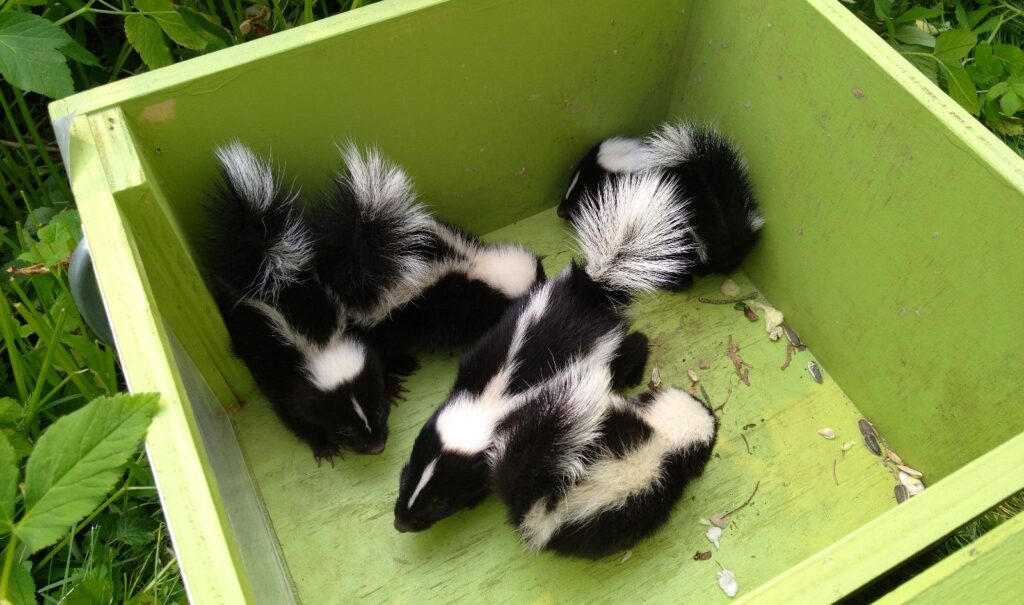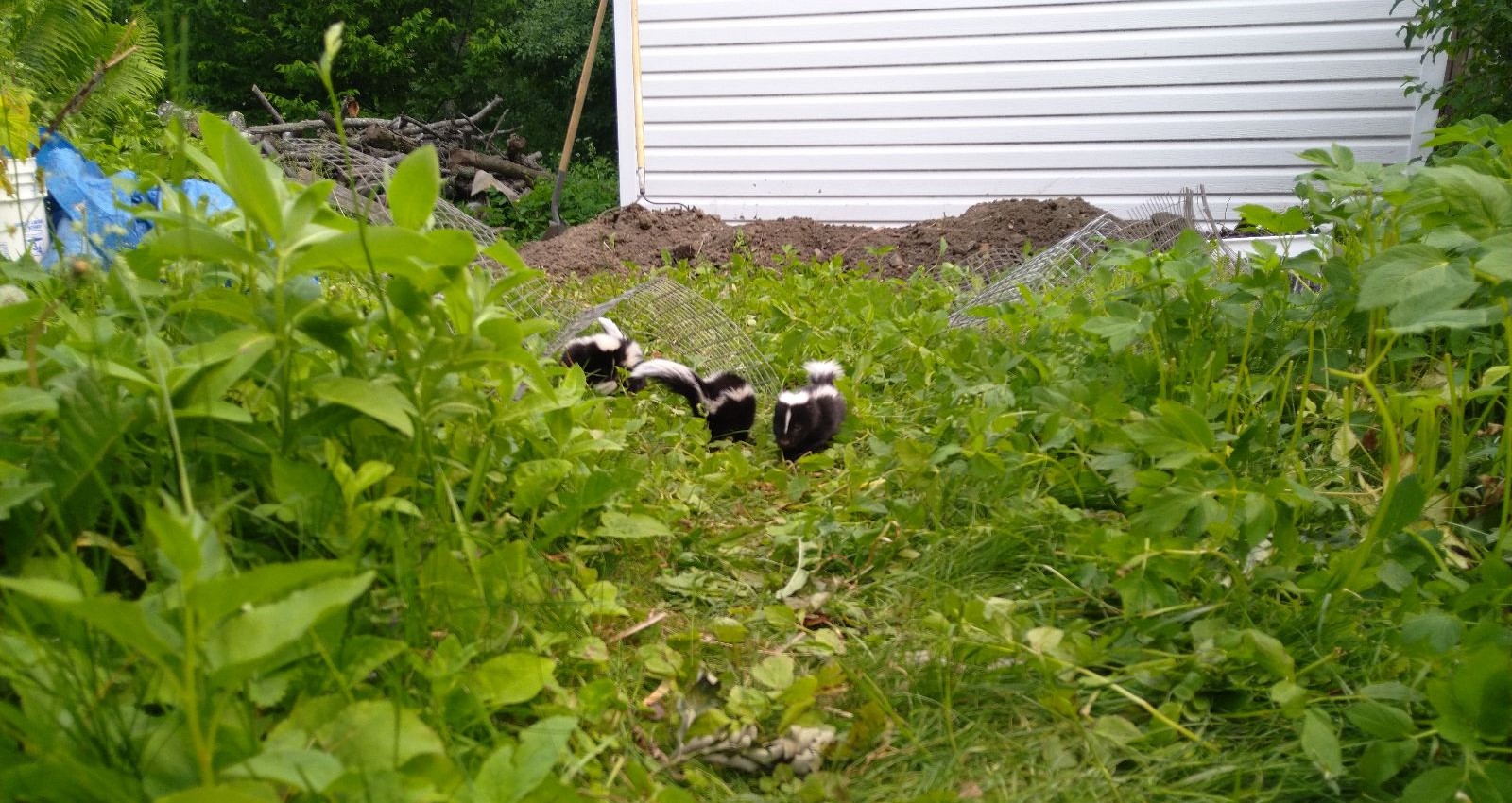Imagine the peaceful ambiance of your backyard being disrupted by the pungent smell of a skunk. Waking up to overturned trash bins and scattered garbage becomes a frequent and frustrating occurrence for many Plymouth residents. This common issue often leads one to wonder: is your garbage attracting skunks? Unfortunately, the answer is often yes. Skunks, in their quest for an easy meal, are notorious for rummaging through residential waste, leading to messy yards and potential skunk infestation.
Managing waste effectively is crucial in preventing unwelcome visits from skunks and other wildlife. Poorly managed garbage not only attracts these nocturnal animals but also provides them with a steady food supply, encouraging repeated visits and even setting up residences nearby.
Need to know how to get rid of a skunk in your yard? Effective wildlife control begins with proper waste management, which is essential in keeping your yard free from skunks. In this piece, we’ll explore why skunks are drawn to your garbage, what they typically eat, and practical steps you can take to deter them. With Skedaddle Humane Wildlife Control in Hennepin County, you can ensure a safe and skunk-free environment for your home.
Skunk Habits and Diet: Why They’re Attracted to Our Homes
When we think about the habits of skunks, it’s clear that these creatures are primarily nocturnal, which means they are most active at night. Skunks are opportunistic feeders with a highly varied diet, which includes everything from insects and grubs to small rodents and bird eggs. Their natural diet also features fruits, berries, and plants. This diverse palate enables skunks to thrive in a variety of environments.
So, why are skunks so often seen in human settlements? Simply put, they’re on the hunt for food. Our neighborhoods offer easy access to a variety of tasty morsels that skunks find irresistible. Spilled pet food, unsecured trash cans, and edible garden produce are like a buffet to them. Consequently, when we don’t manage our waste properly, we unintentionally invite these critters to visit and stick around.
What Do Skunks Eat?
Understanding what skunks eat can give us valuable insights into why these creatures venture into our neighborhoods. In their natural habitat, skunks maintain a balanced diet that includes insects, grubs, small rodents, bird eggs, fruits, berries, and various plants. This natural variety ensures they receive essential nutrients and energy to thrive.
However, once they migrate to urban settings, their diet undergoes a significant transformation. Our human habitats offer them an abundant supply of easy-to-access food scraps, often supplemented by our improperly managed garbage. Discarded leftovers, pet food, and fallen fruits from our gardens are a treasure trove for these nocturnal foragers. The presence of these convenient food sources not only attracts them initially but also encourages repeated visits as they learn to associate our homes with reliable meals.
As we continue to provide these accessible food options, we inadvertently support a growing skunk population in our neighborhoods, which heightens the risk of wildlife infestations. By being conscious of how our waste management habits might affect local wildlife, we can take preventive measures to minimize these unwelcome visits.
Common Household Waste Items That Attract Skunks
To effectively deter skunks from our homes, it helps to know which household waste items they’re most likely to find irresistible. In this section, we’ll dive into three major attractants: pet food, garbage, and compost. By understanding how these items draw skunks into our yards, we can take smarter steps in protecting our property.
- Pet Food
Leaving pet food outside is like rolling out the red carpet for skunks. These critters are always on the hunt for easy meals, and accessible pet food is a convenient and nutritious option for them. To avoid attracting skunks, it’s best to feed pets indoors or promptly remove any leftover food from outdoor feeding areas. Using pet food containers with tight-fitting lids can also minimize the chances of these nocturnal visitors finding a feast.
- Garbage
Improperly managed garbage is another major lure for skunks and other wildlife. Overturned trash cans and scattered food scraps can quickly become a habitual eating ground for these animals. Securing garbage bins with tight-fitting, heavy lids and using animal-proof containers can help cut down on this unwanted behavior. Regularly cleaning trash bins can also reduce lingering odors that draw skunks in the first place.
- Compost
While composting is great for the environment, it can also be a beacon for skunks if not managed carefully. Food scraps and other organic materials in compost piles can tempt skunks into our gardens. To make compost less appealing, avoid adding meat, greasy foods, or dairy products. Instead, stick to vegetable scraps and yard waste, and use a well-sealed compost bin to keep critters at bay.

Tips for Securing Garbage Cans and Compost Bins
To keep skunks from wreaking havoc in our outdoor spaces, it’s essential to learn how to properly secure garbage cans and compost bins. Implementing a few practical steps can make a significant difference in deterring these nocturnal visitors.
Properly managed garbage makes our homes less inviting to skunks. Start by investing in sturdy, heavy-duty trash bins with tight-fitting lids that skunks cannot easily open. Place bungee cords or trash can straps over the lids for an extra layer of security. Ensure that garbage bins are stored in a secure location like a garage or shed until collection day. Regularly clean the bins to eliminate any lingering odors that could attract skunks.
Composting is beneficial for the environment, but we must be cautious about how we manage our compost materials. Avoid adding meat, oily foods, or dairy products, as these are particularly tempting for skunks. Stick to vegetable scraps and yard waste, and use a well-sealed compost bin designed to keep animals out. Turning the compost regularly can also help in minimizing odors that might attract wildlife.
Pet food left outdoors is like a magnet for skunks. To prevent this issue, always feed pets indoors or remove any leftover food from outdoor bowls immediately after feeding. Store pet food in airtight containers and keep them inside your home or a secure area. Additionally, regularly harvest fallen fruits from your garden and keep bird feeders clean to reduce the likelihood of attracting skunks.
Organizing Your Garage to Deter Wildlife
A cluttered garage can serve as a beacon for various wildlife, including skunks, because it offers ample hiding spots and potential food sources. When our garages are disorganized, they might contain forgotten food items, pet food, and other organic materials that these critters find irresistible.
To prevent wildlife infestations and keep our garages less attractive to these animals, it’s crucial to adopt practical organization strategies. One effective approach is to use secure cabinets for storing tools and other items that might be appealing to skunks. Robust bins with tight-fitting lids are also essential for storing food items and pet food safely. By preventing access to these goods, we reduce the likelihood of these uninvited guests making our garages their new haven.
In addition to cabinetry and bins, consider regularly decluttering the garage and disposing of any forgotten items that might attract wildlife. Keeping the floor space clear and ensuring that all food-related materials are properly secured can go a long way in minimizing unwanted visits.
Our Professional Wildlife Control Solutions
At Skedaddle Humane Wildlife Control, we pride ourselves on using humane and effective methods for dealing with skunks and other wildlife. Our approach focuses on ensuring the safe and ethical treatment of these animals while effectively keeping them away from residential areas.
- Two-Way Doors: We use specially designed two-way doors that allow skunks to exit a space but prevent them from re-entering. This ensures they are safely removed without causing harm.
- Exclusion Services: Our team secures entry points to homes and structures, preventing skunks from finding new routes inside while maintaining the structure’s integrity and appearance.
- Habitat Modification: By suggesting changes to your property, such as removing access to food sources and potential shelters, we help make the environment less inviting to skunks.
Using our methods, you’re not only addressing the immediate problem but also taking steps toward long-term prevention. Our dedicated professionals are trained to handle these situations with the utmost care and respect for the animals involved, ensuring a harmonious coexistence between humans and wildlife.
Keeping Skunks Away: Essential Tips for a Wildlife-Free Home
Ensuring our garbage and compost bins are properly managed can significantly deter skunks from visiting our homes. Investing in sturdy trash bins with tight-fitting lids, securing them with bungee cords, and cleaning them regularly keeps odors at bay and prevents skunks from accessing food scraps. Similarly, compost bins should be well-sealed and only contain vegetable waste and yard scraps to avoid attracting wildlife.
Organizing our garages also plays a crucial role in keeping skunks away. Using secure cabinets and robust bins to store food items and pet food and regularly decluttering and disposing of forgotten items eliminates potential hiding spots and food sources for skunks. Effective garage organization reduces the chances of wildlife making our garages their new haven.
While preventative measures are vital, engaging professional wildlife control services ensures the safest and most effective solution to skunk infestations. Our humane methods, including two-way doors, exclusion services, habitat modification, and ethical trapping and relocation, prioritize the well-being of the animals while protecting your property.
To prevent skunk infestations and ensure a safe and serene home environment, proper garbage management and organized garages are essential. Skunks are opportunistic feeders and are often drawn to easily accessible food sources, including garbage and compost piles. By following our outlined steps and engaging professional services, you can effectively prevent these nocturnal visitors from wreaking havoc in your yard. To learn more about our services or to request a quote, please contact us today. Our team is here to help you manage wildlife issues with care and expertise.





